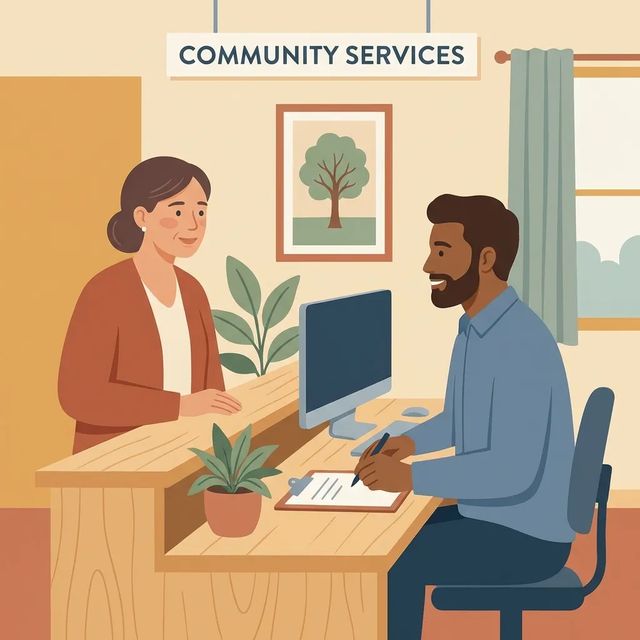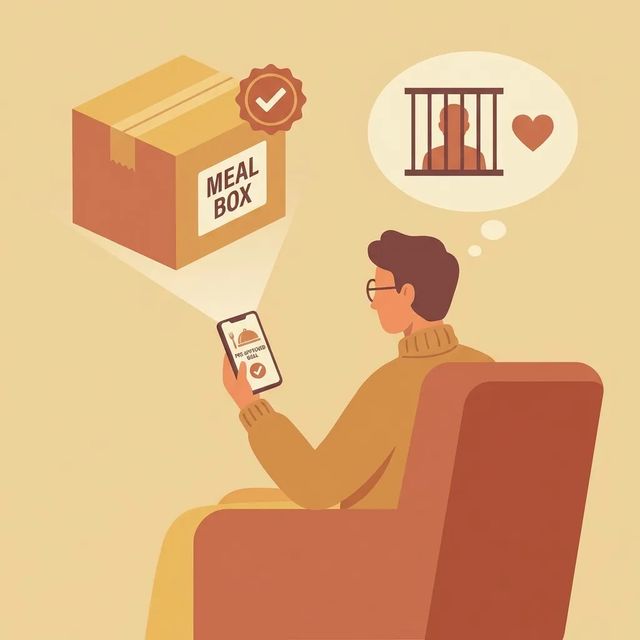Arrendale State Prison
Need to reach someone at Arrendale State Prison? Look up an inmate, send messages or mail, add commissary funds, or schedule a visit.
Explore
Find an Inmate at Arrendale State Prison
Search for a loved one and send messages and photos in minutes.

Guides for This Facility

How to Visit Facility
Visiting someone at Arrendale State Prison starts with one thing: confirming the current visitation schedule before you leave home. The facility posts set hours, but the schedule rotates roughly every 90 days.
Read Guide
How to Contact an Inmate at Arrendale State Prison
Need to get a message to someone at Arrendale State Prison, or sort out a communication issue? Your fastest option is reaching the facility staff who handle these questions directly.
Read Guide
Sending Food Packages to an Inmate at Arrendale via Union Supply (Ordering, Limits, Fees)
Arrendale State Prison uses Union Supply as its approved food package vendor. If you're an approved family member or friend, you can place an order through any of the methods below.
Read GuideAt a Glance
Visitation
- Arrendale rotates its visiting weekends approximately every 90 days; visitors should confirm the current rotation with the facility before planning a trip.
- Visitation is scheduled by inmate last name: A–K visit on Saturdays 9:00 AM–3:00 PM and L–Z visit on Sundays 9:00 AM–3:00 PM; state holidays follow the 9:00 AM–3:00 PM schedule.
- Inmates in diagnostic status are typically transferred before becoming eligible for visits and are only allowed visitation under extenuating circumstances.
Communication
- Primary contact for Arrendale State Prison is Julie Yeargin; the facility lists telephone 706-776-4731 and email julie.yeargin@gdc.ga.gov.
- Warden Murray Tatum is listed with a facility phone contact at 706-776-4800.
- Arrendale’s orientation materials include an orientation packet, phone list, visitation packet, and a letter to family with arrival information.
Sending Commissary
- You can add money via online transfers, lobby kiosks/ATMs, mailed money orders with a printable voucher, or approved vendor/commissary orders.
- Online and phone deposits typically require the state, the specific facility, and the inmate’s name or ID.
- Mailed money orders must follow the facility’s voucher and submission requirements exactly to avoid delays.
Based on official sources and community feedback.Learn how we verify
Topic Overviews
Visitation
Visiting at Arrendale State Prison takes some planning. Weekend visitation rotates about every 90 days, so check with the facility to confirm which weekends are assigned before making the trip. Regular visiting is scheduled by the inmate's last name: A–K on Saturdays and L–Z on Sundays, with both sessions running 9:00 AM to 3:00 PM. State holidays follow the same 9:00 AM to 3:00 PM window. If your loved one is in diagnostic status, they're usually transferred before becoming eligible for visits. Visits during diagnostic status are only allowed in rare, extenuating circumstances. Families can also receive orientation materials on arrival, including an orientation packet, phone list, visitation packet, and an arrival letter. Plan ahead by completing the approval and scheduling process, bringing a valid government photo ID, scheduling early, and following dress and item rules.
Read full guideCommunication
For communication-related questions about Arrendale State Prison, Julie Yeargin is the primary contact for family inquiries. You can reach her at 706-776-4731 or julie.yeargin@gdc.ga.gov. Arrendale's orientation materials are a good first stop. They include an orientation packet, a phone list, a visitation packet, and a letter to family with arrival information. Like most prisons, communication services (phone calls, video visits, electronic messaging) are typically handled through third-party vendors. Expect to create and verify an account, fund it if required, and schedule visits through the vendor's platform. Calls and messages are commonly monitored, and contact may require being on an approved list. Review the orientation materials and vendor setup instructions before trying to connect.
Read full guideSending Commissary
To add money for someone at Arrendale State Prison, common options in Georgia include online transfers through third-party vendors, deposits at lobby kiosks or ATMs, mailed money orders submitted with a facility voucher, or purchases through approved vendor and commissary systems. For online or phone deposits, you'll typically enter the state, the facility name, and the incarcerated person's name or ID so the payment routes correctly. If you mail a money order, follow the voucher and submission rules exactly. Missing or incorrect information can cause delays or returned payments. Funds post to the person's account, but the facility may apply incoming money to outstanding debts before any remaining balance becomes available for commissary. You also generally need to be on the approved sender or visitor list before sending money. Confirm current vendors, fees, and steps with Georgia DOC or the facility.
Read full guideCommon Questions
Showing 6 of 10What are visiting days and hours at Arrendale State Prison?
Visits are scheduled by inmate last name: A–K on Saturdays from 9:00 AM to 3:00 PM, and L–Z on Sundays from 9:00 AM to 3:00 PM. State holidays use the same 9:00 AM to 3:00 PM visiting window.
VisitationHow often does Arrendale change its visitation rotation and should I check before going?
Arrendale’s visiting weekends rotate about every 90 days. Confirm the current rotation with the facility before you go.
VisitationCan I visit someone who is in diagnostic status at Arrendale?
Usually no. People in diagnostic status are typically transferred before they are eligible for visitation, and visits during diagnostic status are only allowed in extenuating circumstances.
VisitationHow do I schedule my first visit at Arrendale and what should I bring?
Start by completing the visitation approval process and requesting a scheduled visit through the department's system or the facility's scheduling process. Bring a valid government-issued photo ID, schedule early (slots fill quickly), and follow dress and item rules to avoid being turned away.
VisitationWho is the communications contact at Arrendale State Prison?
Julie Yeargin is listed as the primary communications contact at Arrendale State Prison. The facility lists 706-776-4731 and julie.yeargin@gdc.ga.gov for family inquiries.
CommunicationWhere can I find Arrendale’s phone list or orientation packet?
Arrendale provides orientation materials that include an orientation packet, a phone list, a visitation packet, and a letter to family with arrival information. Check those first for facility-specific contact and visitation details.
CommunicationMore Guides
Ready to Connect?
Search for your loved one to start communicating today
Did You Know?
Arrendale State Prison schedules visitation based on the inmate's last name. Last names A–K visit on Saturdays, 9:00 AM to 3:00 PM. Last names L–Z visit on Sundays, same hours. State holidays are also open for visitation from 9:00 AM to 3:00 PM.
This guide is based on feedback from 138 families and official facility documentation. Learn how we verify
